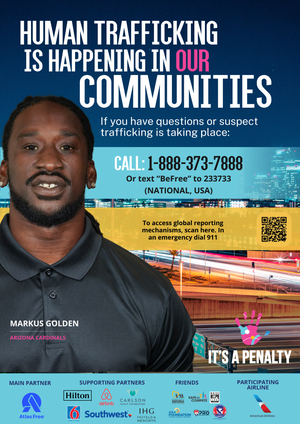No, the Super Bowl won't cause a human trafficking spike in Phoenix – AZCentral

The traditions surrounding the Super Bowl, the most-watched event in professional sports, are time honored. The host city rolls out the red carpet to welcome 100,000 visitors, and millions of viewers anticipate a great game, entertaining halftime show and catchy commercials.
Just as entrenched as those traditions is the annual reminder that the Super Bowl causes human trafficking to spike in its host city. Sounds like a valuable PSA, right? There's only one problem – it isn't true.
The widely repeated myth that the Super Bowl (or any other major sporting event) causes an uptick in human trafficking has been debunked repeatedly. Despite this, some reports persist to cause confusion.
Human trafficking is a real problem
There is no definitive data that point to a significant increase in trafficking during the Super Bowl.
Here's what is true: human trafficking, also known as modern slavery, is a massive global problem. A September 2022 report indicated that 28 million people around the world are trapped in conditions of sex trafficking or labor trafficking – a significant increase since the last report six years ago.
Sex and labor trafficking exists in every state across the United States and in every country around the world. Put simply, human trafficking is the exploitation of another person for profit.
Many factors other than the Super Bowl cause human trafficking to increase. The pandemic and its aftereffects, new and protracted conflict, poverty, food insecurity, homelessness and discrimination are among the root causes of human trafficking.
Why the Super Bowl myth is so harmful
Repeating the Super Bowl myth causes a number of harms.
Notably, misplaced attention to “cracking down” on human trafficking at the Super Bowl distorts the truth of what actually drives human trafficking. It can also erroneously cause people to believe that human trafficking mostly, or only, accompanies major sporting events.
Super Bowl campaign: NFL calls attention to human trafficking
Well-meaning Super Bowl anti-trafficking advertisements often use images that are inaccurate and unhelpful. More specifically, many images depict young female victims in chains or bound by rope.
In reality, traffickers use much less obvious forms of control, such as threats of violence, false promises or control over a victim's family member.
Imagery like this is extremely problematic because if we lead Americans to believe that all trafficking victims will be in chains, they are likely to miss the signs of distress by those we might encounter in our daily life.
Increased attention does help Phoenix
Despite our concerns with the myth, there is undoubtedly some good that comes from this level of attention. The Super Bowl, and other major events, brings interest, attention and resources to help a host city build or strengthen its response to human trafficking, and the NFL has invested in helping these efforts surrounding this year's Super Bowl.
Building and strengthening local networks – from training for law enforcement to supporting NGOs, or nongovernmental organizations, serving survivors – will address human trafficking 365 days a year.
This year, with the active coordination and support of the Arizona Human Trafficking Council, the NFL, the Arizona Host Committee, local law enforcement, service providers, airports and dozens of other organizations, thousands of stakeholders have been trained about the indicators of human trafficking and how to respond to a potential situation in a victim-centered manner.
This increased capacity will serve victims long after the final whistle of Super Bowl 57 is blown.
Arizonans can be a powerful force in the fight against trafficking as conscious consumers, grassroots advocates and informed citizens.
Look closely at the products you buy and use your power as a consumer to avoid goods that may have been produced with forced or child labor. Call on your elected officials to strengthen laws and direct funding to vital anti-trafficking efforts.
And if you believe you have information about a trafficking situation, call the National Human Trafficking Hotline (888-373-7888).
Kristen Leanderson Abrams is the senior director of combatting human trafficking at the McCain Institute and Nate King is the director of congressional affairs at International Justice Mission. Reach them at[email protected] and [email protected].
 ABOUT PBJ LEARNING
ABOUT PBJ LEARNING
PBJ Learning is a leading provider of online human trafficking training, focusing on awareness and prevention education. Their interactive Human Trafficking Essentials online course is used worldwide to educate professionals and individuals how to recognize human trafficking and how to respond to potential victims. Learn on any web browser (even your mobile phone) at any time.
More stories like this can be found in your PBJ Learning Knowledge Vault.
This “Eyes on Trafficking” story is reprinted from its original online location.
ABOUT PBJ LEARNING
PBJ Learning is a leading provider of online human trafficking training, focusing on awareness and prevention education. Their interactive Human Trafficking Essentials online course is used worldwide to educate professionals and individuals how to recognize human trafficking and how to respond to potential victims. Learn on any web browser (even your mobile phone) at any time.
More stories like this can be found in your PBJ Learning Knowledge Vault.
